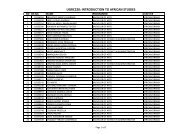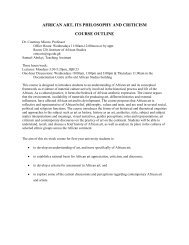A situation analysis of mental health services and ... - UGSpace
A situation analysis of mental health services and ... - UGSpace
A situation analysis of mental health services and ... - UGSpace
You also want an ePaper? Increase the reach of your titles
YUMPU automatically turns print PDFs into web optimized ePapers that Google loves.
ORIGINAL Afr J Psychiatry 2010;13:99-108<br />
A <strong>situation</strong> <strong>analysis</strong> <strong>of</strong> <strong>mental</strong><br />
<strong>health</strong> <strong>services</strong> <strong>and</strong> legislation in<br />
Ghana: challenges for<br />
transformation<br />
A Ofori-Atta 1 , UM Read 2 , C Lund 3 , MHaPP Research Programme Consortium 4<br />
1<br />
University <strong>of</strong> Ghana Medical School, Korle-Bu, Ghana.<br />
2<br />
Department <strong>of</strong> Anthropology, University College London, UK<br />
3<br />
Department <strong>of</strong> Psychiatry <strong>and</strong> Mental Health, University <strong>of</strong> Cape Town, South Africa<br />
4<br />
The Mental Health <strong>and</strong> Poverty Project (MHaPP) is a Research Programme Consortium (RPC) funded by the UK Department for<br />
International Development (DfID)(RPC HD6 2005-2010) for the benefit <strong>of</strong> developing countries. The views expressed are not necessarily<br />
those <strong>of</strong> DfID. RPC members include Alan J. Flisher (Director) <strong>and</strong> Crick Lund (Co-ordinator) (University <strong>of</strong> Cape Town, Republic <strong>of</strong><br />
South Africa (RSA)); Therese Agossou, Natalie Drew, Edwige Faydi <strong>and</strong> Michelle Funk (World Health Organization); Arvin Bhana (Human<br />
Sciences Research Council, RSA); Victor Doku (Kintampo Health Research Centre, Ghana); Andrew Green <strong>and</strong> Mayeh Omar (University<br />
<strong>of</strong> Leeds, UK); Fred Kigozi (Butabika Hospital, Ug<strong>and</strong>a); Martin Knapp (University <strong>of</strong> London, UK); John Mayeya (Ministry <strong>of</strong> Health,<br />
Zambia); Eva N Mulutsi (Department <strong>of</strong> Health, RSA); Sheila Zaramba Ndyanabangi (Ministry <strong>of</strong> Health, Ug<strong>and</strong>a); Angela Ofori-Atta<br />
(University <strong>of</strong> Ghana); Akwasi Osei (Ghana Health Service); <strong>and</strong> Inge Petersen (University <strong>of</strong> KwaZulu-Natal, RSA).<br />
Abstract<br />
Objective: To conduct a <strong>situation</strong> <strong>analysis</strong> <strong>of</strong> the status <strong>of</strong> <strong>mental</strong> <strong>health</strong> care in Ghana <strong>and</strong> to propose options for scaling up the<br />
provision <strong>of</strong> <strong>mental</strong> <strong>health</strong> care. Method: A survey <strong>of</strong> the existing <strong>mental</strong> <strong>health</strong> system in Ghana was conducted using the WHO<br />
Assessment Instrument for Mental Health Systems. Documentary <strong>analysis</strong> was undertaken <strong>of</strong> <strong>mental</strong> <strong>health</strong> legislation, utilizing the<br />
WHO Legislation checklists. Semi-structured interviews <strong>and</strong> focus group discussions were conducted with a broad range <strong>of</strong> <strong>mental</strong><br />
<strong>health</strong> stakeholders (n=122) at the national, regional <strong>and</strong> district levels. Results: There are shortfalls in the provision <strong>of</strong> <strong>mental</strong><br />
<strong>health</strong> care including insufficient numbers <strong>of</strong> <strong>mental</strong> <strong>health</strong> pr<strong>of</strong>essionals, aging infrastructure, widespread stigma, inadequate<br />
funding <strong>and</strong> an inequitable geographical distribution <strong>of</strong> <strong>services</strong>. Conclusion: Community-based <strong>services</strong> need to be delivered<br />
in the primary care setting to provide accessible <strong>and</strong> humane <strong>mental</strong> <strong>health</strong> care. There is an urgent need for legislation reform,<br />
to improve <strong>mental</strong> <strong>health</strong> care delivery <strong>and</strong> protect human rights.<br />
Key words: Mental <strong>health</strong>; Legislation; Ghana<br />
Received: 07-11-2008<br />
Accepted: 02-03-2009<br />
Introduction<br />
Mental <strong>health</strong> care is <strong>of</strong>ten one <strong>of</strong> the lowest <strong>health</strong> priorities<br />
for low-income countries 1 <strong>and</strong> Ghana is no exception. In<br />
common with many low-income post-colonial countries in<br />
Africa, Ghana has not developed the infrastructure <strong>and</strong> public<br />
<strong>services</strong>, including <strong>mental</strong> <strong>health</strong> care, to keep pace with<br />
population expansion. The population <strong>of</strong> Ghana has more than<br />
doubled since independence in 1957 2 with a consequent<br />
Correspondence:<br />
Angela Ofori-Atta<br />
University <strong>of</strong> Ghana Medical School, Korle-Bu,<br />
c/o P.O. Box 3859, Accra, Ghana<br />
email: angielam@4u.com.gh<br />
growth in the numbers <strong>of</strong> people suffering from <strong>mental</strong><br />
disorders. Recent research has revealed the extent to which<br />
<strong>mental</strong> <strong>health</strong> care in many low <strong>and</strong> middle-income countries<br />
is consistently under-resourced. 3-5 In the relative absence <strong>of</strong><br />
community care, institutionalised care remains the norm for<br />
many <strong>of</strong> those with <strong>mental</strong> <strong>health</strong> problems in low-income<br />
countries. 5 Indeed, in countries such as Ghana, many <strong>of</strong> those<br />
in need <strong>of</strong> treatment do not reach psychiatric <strong>services</strong> at all,<br />
but seek the care <strong>of</strong> informal community <strong>mental</strong> <strong>health</strong><br />
<strong>services</strong> 6 such as traditional <strong>and</strong> faith healers <strong>and</strong> family<br />
members who <strong>of</strong>fer a varying quality <strong>of</strong> service <strong>and</strong> level <strong>of</strong><br />
efficacy.<br />
In addition, there is increasing evidence from developing<br />
countries that <strong>mental</strong> illness is strongly associated with<br />
African Journal <strong>of</strong> Psychiatry • May 2010 99
ORIGINAL Afr J Psychiatry 2010;13:99-108<br />
poverty. 7-9 Despite some significant economic growth in<br />
recent years, Ghana is classified as a low-income country with<br />
28.5% <strong>of</strong> the population living in poverty, <strong>and</strong> 18.2% living in<br />
extreme poverty, especially in rural areas. 10 Yet there is a<br />
growing body <strong>of</strong> research demonstrating innovative, costeffective<br />
interventions for <strong>mental</strong> disorders such as<br />
schizophrenia <strong>and</strong> depression in low-income African<br />
countries. 11-13 Among these are agricultural rehabilitation<br />
villages in Tanzania 14 , family involvement in hospital care in<br />
Senegal 15,16 , group therapy for the treatment <strong>of</strong> depression in<br />
Ug<strong>and</strong>a 17 , <strong>and</strong> collaborations with traditional healers in<br />
northern Ghana. 18 In Africa therefore, as in other regions <strong>of</strong><br />
the world, the deficit is not in the evidence for interventions to<br />
address <strong>mental</strong> <strong>health</strong> problems, but in the resources <strong>and</strong><br />
political will that can make these interventions available to<br />
those who need them.<br />
Ghana currently st<strong>and</strong>s in a relatively unique position<br />
within the African continent to respond to this challenge. In<br />
spite <strong>of</strong> its low-income status, the country has one <strong>of</strong> the<br />
highest literacy rates within West Africa (57.9%) 19 , is<br />
considered a relatively stable <strong>and</strong> peaceful democracy with<br />
good st<strong>and</strong>ards <strong>of</strong> governance, <strong>and</strong> has a strong <strong>and</strong> diverse<br />
civil society. As one <strong>of</strong> the first countries to gain independence<br />
in 1957, it was also one <strong>of</strong> the pioneers <strong>of</strong> primary <strong>health</strong> care<br />
in the region 20 <strong>and</strong> initiated early attempts to develop <strong>mental</strong><br />
<strong>health</strong> care in the first years <strong>of</strong> independence with the<br />
establishment <strong>of</strong> new psychiatric hospitals <strong>and</strong> later the<br />
introduction <strong>of</strong> psychology, occupational therapy <strong>and</strong><br />
community psychiatric nursing. Today, despite the shortage <strong>of</strong><br />
specialist psychiatric personnel, Ghana remains relatively<br />
well-resourced for <strong>mental</strong> <strong>health</strong> care in comparison to other<br />
countries in the region. 3<br />
There have also been several attempts to respond to the<br />
call to develop <strong>mental</strong> <strong>health</strong> provision in primary care <strong>and</strong> to<br />
provide community-based <strong>mental</strong> <strong>health</strong> <strong>services</strong>. The<br />
training <strong>of</strong> community psychiatric nurses was instituted in<br />
1976 when these nurses were posted to approximately half<br />
the districts in the country. Between 1994 <strong>and</strong> 1998 primary<br />
<strong>health</strong> care <strong>and</strong> development workers in the Upper West<br />
Region <strong>of</strong> Ghana were trained in <strong>mental</strong> <strong>health</strong> care,<br />
integrating <strong>mental</strong> <strong>health</strong> into primary care. 21 Similarly, in<br />
1998 the WHO Nations for Mental Health Project trained<br />
<strong>health</strong> volunteers to provide community support to patients<br />
with <strong>mental</strong> disorders. 22,23<br />
Despite these innovations, a comprehensive <strong>situation</strong><br />
<strong>analysis</strong> <strong>of</strong> the <strong>mental</strong> <strong>health</strong> system in Ghana has not yet been<br />
undertaken. This paper presents the results <strong>of</strong> a <strong>situation</strong><br />
<strong>analysis</strong> <strong>of</strong> the current status <strong>of</strong> <strong>mental</strong> <strong>health</strong> policy <strong>and</strong><br />
<strong>services</strong> in Ghana which was conducted as part <strong>of</strong> the first<br />
phase <strong>of</strong> the Mental Health <strong>and</strong> Poverty Project (MHaPP). The<br />
MHaPP, which is being conducted in four African countries:<br />
Ghana, South Africa, Ug<strong>and</strong>a <strong>and</strong> Zambia, aims to investigate<br />
the policy level interventions that are required to break the<br />
vicious cycle <strong>of</strong> poverty <strong>and</strong> <strong>mental</strong> ill-<strong>health</strong>, in order to<br />
generate lessons for a range <strong>of</strong> low- <strong>and</strong> middle-income<br />
countries. 24 Based on the findings <strong>of</strong> the <strong>situation</strong> <strong>analysis</strong>, the<br />
paper presents proposals for transforming <strong>mental</strong> <strong>health</strong> care<br />
in Ghana to provide for the majority <strong>of</strong> those in need <strong>and</strong> to<br />
protect the human rights <strong>of</strong> patients <strong>and</strong> their families in a way<br />
which is culturally responsive <strong>and</strong> cost-effective within the<br />
budget <strong>of</strong> a low-income country.<br />
Methods<br />
The WHO Assessment Instrument for Mental Health Systems<br />
Version 2.2 (WHO AIMS) 25 was completed by the researchers<br />
with the aid <strong>of</strong> 48 key stakeholders in <strong>health</strong> <strong>and</strong> <strong>mental</strong> <strong>health</strong><br />
care to provide an overview <strong>of</strong> <strong>mental</strong> <strong>health</strong> policy <strong>and</strong><br />
<strong>services</strong>. Data for the WHO-AIMS was collected for the index<br />
year <strong>of</strong> 2005.<br />
Documentary <strong>analysis</strong> <strong>of</strong> <strong>mental</strong> <strong>health</strong> legislation was<br />
conducted utilising the WHO Checklist for Mental Health<br />
Legislation 26 , which is designed to assess the content <strong>and</strong><br />
development <strong>of</strong> <strong>mental</strong> <strong>health</strong> legislation, according to a<br />
number <strong>of</strong> criteria. The checklist was completed by a team<br />
consisting <strong>of</strong> a clinical psychologist, a psychiatrist, a research<br />
<strong>of</strong>ficer, the national coordinator <strong>of</strong> community psychiatric<br />
nurses (CPNs), <strong>and</strong> the deputy director <strong>of</strong> nursing <strong>services</strong> at<br />
the Accra Psychiatric Hospital. Documents evaluated included:<br />
the 1972 Mental Health Decree 27 , <strong>and</strong> the 2006 draft Mental<br />
Health Bill. 28<br />
Eighty-one interviews <strong>and</strong> 7 focus group discussions were<br />
held with policy makers, <strong>health</strong> pr<strong>of</strong>essionals, healers, users <strong>of</strong><br />
psychiatric <strong>services</strong>, teachers, police <strong>of</strong>ficers, academics, <strong>and</strong><br />
religious <strong>and</strong> traditional leaders drawn from five <strong>of</strong> the ten<br />
regions in Ghana. The interviews <strong>and</strong> focus group discussions<br />
were conducted with 122 respondents, who were purposively<br />
sampled from among the major stakeholders in <strong>mental</strong> <strong>health</strong><br />
at the national, regional <strong>and</strong> district levels.<br />
Semi-structured interview guides were tailored according<br />
to the specific individual being interviewed. Topics covered<br />
included general policy making process in Ghana, the process<br />
<strong>of</strong> <strong>mental</strong> <strong>health</strong> policy <strong>and</strong> legislation development, the role <strong>of</strong><br />
stakeholders in <strong>mental</strong> <strong>health</strong> policy <strong>and</strong> legislation<br />
development, the content <strong>of</strong> the current <strong>mental</strong> <strong>health</strong> policy<br />
<strong>and</strong> legislation, <strong>and</strong> the implementation <strong>of</strong> <strong>mental</strong> <strong>health</strong> policy<br />
<strong>and</strong> legislation at the national <strong>and</strong> regional levels. Thirty-five<br />
interviews were held at the national level, <strong>and</strong> 23 at the<br />
regional level. One focus group discussion was held at the<br />
national level.<br />
Interviews were digitally recorded with participants’<br />
consent <strong>and</strong> transcribed verbatim. Interviews in the local<br />
Ghanaian language (Twi) were first transcribed <strong>and</strong> then<br />
translated into English by staff <strong>of</strong> the Bureau <strong>of</strong> Ghana<br />
Languages. All transcripts were entered into Nvivo 7 which<br />
was used for coding <strong>and</strong> <strong>analysis</strong>. A framework <strong>analysis</strong><br />
approach was adopted 29 in which certain themes were agreed<br />
upon by investigators from all four study countries based on<br />
the objectives <strong>of</strong> the study. From these objectives, sub-themes<br />
were suggested by country partners, <strong>and</strong> reviewed by all<br />
partners through a process <strong>of</strong> iteration, until a single<br />
framework was agreed upon that could be used by all four<br />
study countries. Where specific themes emerged from the<br />
interviews that were not included in the generic cross-country<br />
framework, these were added to the coding frame, to adapt the<br />
<strong>analysis</strong> to issues specific to Ghana. Transcripts were coded<br />
on the basis <strong>of</strong> these themes, with additional themes added to<br />
the coding framework as determined by the data. Interviews<br />
were coded independently for 10% <strong>of</strong> r<strong>and</strong>omly sampled<br />
interviews to ensure inter-rater reliability. Inter-rater reliability<br />
was always above 90%.<br />
Ethical approval was granted by the Ghana Health Service<br />
Ethics Committee <strong>and</strong> the Institutional Ethics Board at<br />
Kintampo Health Research Centre. Information sheets<br />
African Journal <strong>of</strong> Psychiatry • May 2010 100
ORIGINAL Afr J Psychiatry 2010;13:99-108<br />
containing essential information about the study <strong>and</strong> the<br />
implications <strong>of</strong> participation were given to all participants.<br />
Participants who were unable to read had a witness read<br />
the information sheet <strong>and</strong> consent form to them in Twi.<br />
Participants were requested to sign a consent form to<br />
indicate their willingness to participate in the study. Those<br />
participants who were unable to write were requested to<br />
provide a thumb print in lieu <strong>of</strong> a signature in the presence<br />
<strong>of</strong> a witness. The names <strong>and</strong> other identifying features <strong>of</strong><br />
the respondents were removed from the transcripts in<br />
order to ensure confidentiality.<br />
Results<br />
Policy, governance <strong>and</strong> organisational structure<br />
Policy is formulated at the ministerial level, <strong>and</strong><br />
implemented through the Ghana Health Service (GHS).<br />
The Mental Health Unit which oversees <strong>mental</strong> <strong>health</strong><br />
<strong>services</strong>, is placed under GHS’s Institutional Care Division<br />
(see Figure 1). The Mental Health Unit acts as the national<br />
<strong>mental</strong> <strong>health</strong> authority, advising the government on <strong>mental</strong><br />
<strong>health</strong> policies <strong>and</strong> legislation, <strong>and</strong> providing monitoring<br />
<strong>and</strong> quality assessment <strong>of</strong> <strong>mental</strong> <strong>health</strong> <strong>services</strong>. The Unit<br />
oversees the three government psychiatric hospitals, the<br />
psychiatric wings <strong>of</strong> the 5 regional hospitals, community<br />
<strong>mental</strong> <strong>health</strong> <strong>services</strong>, <strong>and</strong> private psychiatric facilities.<br />
Traditional <strong>and</strong> faith healers are also supposed to be under<br />
the supervision <strong>of</strong> the unit, however in practice there is<br />
little oversight.<br />
Financing <strong>of</strong> Mental Health Services<br />
It was reported that approximately 6.2 % <strong>of</strong> the <strong>health</strong> care<br />
budget <strong>of</strong> the Ministry <strong>of</strong> Health was dedicated to <strong>mental</strong><br />
<strong>health</strong> in 2005. In addition to this, results <strong>of</strong> interviews with<br />
<strong>mental</strong> <strong>health</strong> pr<strong>of</strong>essionals <strong>and</strong> Ministry <strong>of</strong> Finance<br />
<strong>of</strong>ficials indicated that due to the policy <strong>of</strong> decentralisation,<br />
funding is disbursed to Budget Management<br />
Centres at the regional <strong>and</strong> district levels some <strong>of</strong> which<br />
may be allocated to <strong>mental</strong> <strong>health</strong>. However there were no<br />
figures available on <strong>mental</strong> <strong>health</strong> expenditure at the<br />
district level.<br />
The majority <strong>of</strong> the budget for <strong>mental</strong> <strong>health</strong> (nearly<br />
80%) is allocated for the maintenance <strong>of</strong> the three<br />
psychiatric hospitals. Despite this, funding for the<br />
psychiatric hospitals was described by one psychiatric<br />
nurse as “woefully inadequate”. Participants reported that<br />
funds are quickly absorbed in meeting the basic needs <strong>of</strong><br />
patients, <strong>and</strong> the psychiatric hospitals <strong>of</strong>ten run out <strong>of</strong><br />
sufficient funds to feed patients. Therefore little <strong>of</strong> the<br />
budget is available for psychosocial <strong>and</strong> rehabilitative<br />
interventions.<br />
The National Health Insurance Scheme (NHIS) does not<br />
cover psychiatric <strong>services</strong> because by policy treatment for<br />
<strong>mental</strong> disorders is provided free <strong>of</strong> charge at the<br />
government psychiatric hospitals <strong>and</strong> through community<br />
psychiatric nurses. However if these are not accessible, or<br />
medication runs out as can occur, then patients have to<br />
purchase these privately without recourse to a refund. Many<br />
psychiatric patients who do not have <strong>health</strong> insurance are<br />
not covered for treatment <strong>of</strong> co-morbid physical conditions.<br />
Mental <strong>health</strong> <strong>services</strong><br />
Inpatient care<br />
There are three government psychiatric hospitals in Ghana<br />
providing 7.04 beds per 100,000 population. Accra <strong>and</strong><br />
Pantang Psychiatric Hospitals are located in Accra, <strong>and</strong><br />
Ankaful Psychiatric Hospital is in the Central region. There<br />
are 4 private psychiatric institutions which provide<br />
outpatient clinics <strong>and</strong> inpatient care. Two are located close<br />
to Accra <strong>and</strong> two near the second largest city <strong>of</strong> Kumasi.<br />
There are psychiatric in-patient units in 5 <strong>of</strong> the 10 regional<br />
general hospitals in the country providing a total <strong>of</strong> 77 beds<br />
(0.33 beds per 100,000 population), with the number <strong>of</strong><br />
beds per unit ranging from 10 to 22. The ratio <strong>of</strong> psychiatric<br />
beds in the <strong>mental</strong> hospitals in or around Accra, the capital,<br />
to the total number <strong>of</strong> beds in the rest <strong>of</strong> the country is 6.28<br />
to 1, indicating a concentration <strong>of</strong> inpatient resources in<br />
urban areas.<br />
There were 6,605 admissions to the three state<br />
psychiatric hospitals in 2005. Approximately 50% <strong>of</strong> these<br />
were female. It is likely that this number may include repeat<br />
Figure 1: Organisation <strong>of</strong> <strong>mental</strong> <strong>health</strong> <strong>services</strong> in Ghana.<br />
African Journal <strong>of</strong> Psychiatry • May 2010 101
ORIGINAL Afr J Psychiatry 2010;13:99-108<br />
admissions due to the failure to capture unique patient<br />
identifiers in the <strong>health</strong> information system. The state<br />
psychiatric hospitals are chronically overcrowded by as much<br />
as a third more patients than beds.<br />
Inpatient stays are frequently lengthy which exacerbates<br />
the pressure on hospital beds (Table I). One <strong>of</strong> the reasons for<br />
such long admissions is the stigma attached to <strong>mental</strong><br />
disorders, which can result in relatives or caregivers<br />
ab<strong>and</strong>oning the person at the psychiatric hospitals. Secondly,<br />
while the individual is in the care <strong>of</strong> the hospital they receive<br />
free board <strong>and</strong> lodging, as well as treatment. This can prove an<br />
attractive benefit for both the patient <strong>and</strong> the family,<br />
particularly those with limited financial means. In addition, due<br />
to the absence <strong>of</strong> secure hospitals <strong>and</strong> the inefficiency <strong>of</strong> the<br />
legal system, some <strong>of</strong>fenders who have been ordered by the<br />
courts to be admitted for a psychiatric assessment can remain<br />
in the psychiatric hospitals for many months.<br />
Table I: Number <strong>of</strong> beds <strong>and</strong> length <strong>of</strong> inpatient admission to<br />
psychiatric hospitals.<br />
Hospital Bed capacity Average length <strong>of</strong> Number <strong>of</strong> long stay<br />
hospital admission patients*<br />
Ankaful 250 82.2 days Not available<br />
Pantang 500 285 days 205<br />
Accra 800 Not available 520<br />
*patients who have recovered but remain in hospital<br />
Psychotic disorders are the most frequent in-patient diagnosis<br />
in the psychiatric hospitals, followed by substance use<br />
disorders <strong>and</strong> mood <strong>and</strong> affective disorders (Table II). Neurotic<br />
disorders are rarely diagnosed <strong>and</strong> recorded. There are also<br />
many cases with unspecified diagnoses. There are difficulties<br />
interpreting the data as diagnosis is frequently not<br />
st<strong>and</strong>ardised, according to several stakeholders who were<br />
interviewed.<br />
Outpatient care<br />
A total <strong>of</strong> 86,003 service attended the outpatient departments<br />
at the three psychiatric hospitals in 2005 (Table III). There is<br />
some overlap in these statistics since some patients attend<br />
more than one psychiatric hospital.<br />
Table III: Outpatient attendance by gender at psychiatric<br />
hospitals in Ghana, 2005.<br />
Hospital Male Female Total<br />
Accra 20,462 23,682 44,211<br />
Pantang 6,922 5,963 12,885<br />
Ankaful N/A N/A 28,907<br />
Total N/A N/A 86,003<br />
(N/A = not available)<br />
Sub-Specialist <strong>services</strong><br />
There are no dedicated outpatient facilities for child <strong>and</strong><br />
adolescent <strong>mental</strong> <strong>health</strong> in Ghana. A total <strong>of</strong> 2,578 patients<br />
under the age <strong>of</strong> 19 years were seen at all three hospitals.<br />
There are 45 dedicated inpatient beds for children <strong>and</strong><br />
adolescents in the psychiatric hospitals, representing 4% <strong>of</strong><br />
the total. There are 10 residential facilities for children under<br />
17 with intellectual disabilities, one in each <strong>of</strong> the regions. In<br />
addition, a non-govern<strong>mental</strong> organisation (NGO) provides<br />
residential care <strong>and</strong> rehabilitation in the Brong Ahafo region<br />
for children with intellectual disabilities. There is also a private<br />
school for children with intellectual disabilities in Accra. There<br />
are dedicated beds for older people at the Accra Psychiatric<br />
Hospital. However there are no specialised <strong>mental</strong> <strong>health</strong><br />
<strong>services</strong> for older people, or people with dementia.<br />
In Accra psychiatric hospital there is a dedicated forensic<br />
ward with 15 beds <strong>and</strong> more than 300 patients. However this is<br />
not used solely by forensic patients. In Pantang hospital in<br />
2005, there were 88 forensic patients. There are 2 private<br />
residential facilities for people with substance abuse <strong>and</strong> one<br />
private hospital in Accra has a detoxification unit.<br />
Rehabilitation, residential <strong>and</strong> day <strong>services</strong><br />
There are very few rehabilitation <strong>and</strong> day <strong>services</strong> for people<br />
with <strong>mental</strong> disorders. Those which exist are largely run by<br />
NGOs <strong>and</strong> faith-based organisations. There are 15 beds in an<br />
inpatient rehabilitation facility which forms part <strong>of</strong> Ankaful<br />
psychiatric hospital <strong>and</strong> 6 community residential facilities run<br />
by voluntary <strong>and</strong> church organisations which provide drug<br />
rehabilitation. Cheshire Home in Kumasi provides residential<br />
rehabilitation <strong>and</strong> vocational training for up to 55 adults with<br />
Table II: Inpatient diagnoses at psychiatric hospitals in Ghana, 2005.<br />
Diagnosis Accra Pantang Ankaful Total %<br />
Mental <strong>and</strong> behavioural disorders due to psychoactive substance use (F10-F19) 808 338 362 1508 22.8%<br />
Schizophrenia, schizotypal, <strong>and</strong> delusional disorders (F20-F29) 1442 516 511 2469 37.4%<br />
Mood, affective disorders (F30-39) 605 138 510 1253 19.0%<br />
Neurotic, stress-related <strong>and</strong> somat<strong>of</strong>orm disorders (F40-F48) 0 0 0 None recorded<br />
Disorders <strong>of</strong> adult personality <strong>and</strong> behaviour (F60-F69) 0 0 0 None recorded<br />
Others* 1232 86 57 1375 20.8%<br />
Total 6605 100%<br />
*includes epilepsy, dementia, other organic disorders, <strong>and</strong> unspecified<br />
African Journal <strong>of</strong> Psychiatry • May 2010 102
ORIGINAL Afr J Psychiatry 2010;13:99-108<br />
<strong>mental</strong> disorders. More recently the NGOs Basic Needs<br />
<strong>and</strong> Christian Blind Mission have established three<br />
community-based rehabilitation projects for people with<br />
<strong>mental</strong> disorders in the north <strong>of</strong> Ghana.<br />
There are three known day treatment facilities in Ghana<br />
run by NGOs or church organisations. The Damien Centre<br />
at Takoradi in the southwest <strong>of</strong> the country is run by the<br />
Catholic Church. Two drop-in facilities for vagrants are<br />
provided in Tamale in the Northern region based on the<br />
club house model: Tsi-sampa run by Basic Needs, <strong>and</strong><br />
Shekina, run by a private practitioner. There are no day<br />
treatment facilities run by GHS.<br />
Mental <strong>health</strong> in primary <strong>health</strong> care<br />
Doctors provide primary <strong>mental</strong> <strong>health</strong> care through the<br />
outpatient departments <strong>of</strong> the hospitals. Most government<br />
clinics in the sub-districts do not employ doctors, but are<br />
staffed by medical assistants or nurses, or by personnel<br />
with lower levels <strong>of</strong> training such as community <strong>health</strong><br />
workers or community midwives. Medical assistants<br />
provide assessment, diagnosis <strong>and</strong> treatment, including<br />
prescribing <strong>and</strong> administering medication, <strong>and</strong> effectively<br />
work in a physician role. There are no specialist doctors in<br />
<strong>mental</strong> <strong>health</strong> in primary <strong>health</strong> care clinics in Ghana. In<br />
spite <strong>of</strong> the unavailability <strong>of</strong> physicians in primary <strong>health</strong><br />
care clinics, there are assessment <strong>and</strong> treatment protocols<br />
in most <strong>of</strong> these clinics which include guidance on the<br />
treatment <strong>of</strong> the major psychiatric conditions including<br />
schizophrenia <strong>and</strong> depression. 30<br />
Data on psychiatric morbidity in outpatient<br />
consultations at district <strong>health</strong> facilities is collated at the<br />
regional level under four psychiatric categories: epilepsy,<br />
acute psychosis, neurosis, <strong>and</strong> substance abuse (Table IV).<br />
However, these data are likely to be a significant<br />
underestimate <strong>of</strong> the true incidence since many districts<br />
lack psychiatric pr<strong>of</strong>essionals <strong>and</strong> do not collate data on<br />
psychiatric disorders. Differences between regions are<br />
therefore more likely to be due to differences in recording<br />
<strong>of</strong> cases, than to true differences in morbidity.<br />
Between 21-50% <strong>of</strong> primary <strong>health</strong> care clinics are<br />
estimated to refer patients presenting with <strong>mental</strong><br />
disorders to a higher level <strong>of</strong> care, such as the psychiatric<br />
units <strong>of</strong> the regional hospitals, or the psychiatric hospitals<br />
in Accra or Cape Coast. Communication <strong>and</strong> collaboration<br />
between primary <strong>health</strong> care workers <strong>and</strong> psychiatric<br />
<strong>services</strong> is poor <strong>and</strong> the physical <strong>health</strong> needs <strong>of</strong> the <strong>mental</strong>ly<br />
ill are <strong>of</strong>ten neglected. Between 1-20% <strong>of</strong> workers in the<br />
district hospitals <strong>and</strong> primary <strong>health</strong> care clinics are estimated<br />
to have had contact with a traditional or faith healer. However,<br />
no records <strong>of</strong> such contacts are maintained. Collaboration with<br />
traditional or faith healers tends to be informal <strong>and</strong> is largely<br />
undocumented.<br />
Training in <strong>mental</strong> <strong>health</strong> care for primary care staff<br />
Seven percent <strong>of</strong> the training for medical doctors is devoted to<br />
<strong>mental</strong> <strong>health</strong>. General nurses undertake six weeks affiliation<br />
at the psychiatric hospitals as part <strong>of</strong> their training. Post-basic<br />
medical assistants receive only one week’s training in <strong>mental</strong><br />
<strong>health</strong>. Some training <strong>of</strong> primary <strong>health</strong> care workers in <strong>mental</strong><br />
<strong>health</strong> has been facilitated by Basic Needs <strong>and</strong> an outreach<br />
team from Ankaful Psychiatric Hospital.<br />
In terms <strong>of</strong> refresher training, there were no data available on<br />
how many primary <strong>health</strong> care doctors <strong>and</strong> non-doctor/nonnurse<br />
primary <strong>health</strong> care workers had received refresher<br />
training in <strong>mental</strong> <strong>health</strong> in the index year <strong>of</strong> 2005. However,<br />
responses from the qualitative data indicated that in-service<br />
training in psychiatry is limited. Many <strong>of</strong> the primary <strong>health</strong> care<br />
workers interviewed stated that they have had no training in<br />
psychiatry since they completed their initial clinical training.<br />
Psychotropic medication<br />
All <strong>mental</strong> hospitals, psychiatric units in general hospitals, <strong>and</strong><br />
outpatient <strong>mental</strong> <strong>health</strong> facilities had at least one psychotropic<br />
medicine <strong>of</strong> each therapeutic class (anti-psychotic,<br />
antidepressant, mood stabilizer, anxiolytic, <strong>and</strong> antiepileptic<br />
medicines) available in the facility in 2005. However the range<br />
<strong>of</strong> psychotropic medication available within GHS is limited<br />
largely to older generic drugs. The new generation <strong>of</strong> antipsychotics<br />
<strong>and</strong> anti-depressants, as well as mood stabilising<br />
drugs such as Lithium <strong>and</strong> Sodium Valproate, are not widely<br />
available, despite the inclusion <strong>of</strong> Sodium Valproate <strong>and</strong><br />
Risperidone in the Essential Medicines List. 31 There is limited<br />
availability <strong>of</strong> depot anti-psychotic medication within Ghana<br />
Health Service, especially outside the psychiatric hospitals.<br />
In the qualitative interviews, several respondents indicated<br />
that the supply <strong>of</strong> psychotropic drugs to inpatient <strong>and</strong><br />
community facilities is <strong>of</strong>ten insufficient, leading to shortages<br />
<strong>of</strong> essential medication. When medication is unavailable at the<br />
hospital pharmacies <strong>and</strong> clinics, patients must purchase the<br />
necessary medication at their own expense.<br />
Table IV: Outpatient psychiatric service utilisation per region, 2005.<br />
Disorder WR CR GAR VR ER ASH BAR NR UER UWR Total<br />
Epilepsy 868 200 929 911 581 1,239 737 733 1,005 458 7,661<br />
Acute Psychosis 194 123 1,607 1,612 755 1,044 1,065 221 645 184 7,450<br />
Neurosis 288 276 524 304 431 4,101 660 108 332 103 7,127<br />
Substance Abuse 443 139 739 269 482 1,452 261 84 333 119 4,321<br />
Total new cases 1,793 738 3,799 3,096 2,249 7,836 2,723 1,146 2,315 864 26,559<br />
Data collated from returns submitted by district level facilities.<br />
Key to regions: WR= Western, CR= Central, GAR= Greater Accra, VR= Volta, ER= Eastern, ASH=Ashanti, BAR= Brong Ahafo, NR= Northern,<br />
UER= Upper East, UWR= Upper West<br />
African Journal <strong>of</strong> Psychiatry • May 2010 103
ORIGINAL Afr J Psychiatry 2010;13:99-108<br />
Human rights protection<br />
There is no national body to oversee regular inspections in<br />
<strong>mental</strong> <strong>health</strong> facilities, to review involuntary admission <strong>and</strong><br />
discharge procedures, to review complaints, investigation<br />
processes <strong>and</strong> to impose sanctions (e.g. withdraw<br />
accreditation, impose penalties, or close facilities that<br />
persistently violate human rights). As a result, none <strong>of</strong> the<br />
<strong>mental</strong> hospitals nor the inpatient psychiatric units <strong>and</strong><br />
community residential facilities had any review or<br />
inspection <strong>of</strong> the human rights protection <strong>of</strong> patients in<br />
2005. However in the following two years <strong>of</strong> 2006 <strong>and</strong> 2007,<br />
there were inspections <strong>of</strong> the psychiatric hospitals by the<br />
Commission for Human Rights <strong>and</strong> Administrative Justice,<br />
<strong>and</strong> in 2008 the Parliamentary Sub-Committee on Health<br />
also inspected two <strong>of</strong> the three state psychiatric hospitals.<br />
There was no training in the protection <strong>of</strong> the human rights<br />
<strong>of</strong> patients in the inpatient psychiatric units <strong>and</strong> community<br />
residential facilities in 2005.<br />
Human resources in <strong>mental</strong> <strong>health</strong> care<br />
In 2005 the human resources for <strong>mental</strong> <strong>health</strong> care were:<br />
15 psychiatrists, 468 psychiatric nurses, 132 community<br />
psychiatric nurses (CPNs) based in the ten regions<br />
covering 69 <strong>of</strong> the 138 districts, 7 psychologists, 10<br />
medical assistants, 6 social workers, <strong>and</strong> 1 occupational<br />
therapist. Nine <strong>of</strong> the psychiatrists working in GHS are<br />
<strong>of</strong>ficially retired. The distribution <strong>of</strong> psychiatric nurses per<br />
100,000 <strong>of</strong> the population is 6.29 times greater in Accra<br />
than in the entire country. The low numbers <strong>of</strong><br />
psychologists <strong>and</strong> occupational therapists is largely<br />
attributable to the fact that GHS does not hire<br />
psychologists <strong>and</strong> has no training for occupational<br />
therapists.<br />
Training pr<strong>of</strong>essionals in <strong>mental</strong> <strong>health</strong><br />
The number <strong>of</strong> <strong>health</strong> pr<strong>of</strong>essionals who graduated from<br />
<strong>health</strong> training institutions in 2005 is as follows:<br />
approximately 190 medical doctors (not specialized in<br />
psychiatry), no psychiatrists, 150 nurses with at least 1 year<br />
training in <strong>mental</strong> <strong>health</strong> care, approximately 7<br />
psychologists with at least 1 year training in <strong>mental</strong> <strong>health</strong><br />
care, <strong>and</strong> 35 medical assistants (not specialised in<br />
psychiatry).<br />
Public education <strong>and</strong> awareness campaigns on <strong>mental</strong><br />
<strong>health</strong><br />
Mental <strong>health</strong> pr<strong>of</strong>essionals <strong>and</strong> NGOs have conducted a<br />
few public education <strong>and</strong> awareness campaigns in <strong>mental</strong><br />
<strong>health</strong> in the last five years, such as World Mental Health<br />
Day <strong>and</strong> the 100th anniversary <strong>of</strong> the Accra Psychiatric<br />
Hospital in 2006. The NGO Mindfreedom has held two<br />
‘Mad Pride’ marches in Accra in 2006 <strong>and</strong> 2007 to raise<br />
awareness <strong>of</strong> <strong>mental</strong> <strong>health</strong> <strong>and</strong> promote the rights <strong>of</strong><br />
<strong>mental</strong> <strong>health</strong> service users. Several respondents reported<br />
conducting occasional educational talks on <strong>mental</strong> <strong>health</strong><br />
in schools <strong>and</strong> churches, as well as local radio broadcasts.<br />
Others reported providing training in <strong>mental</strong> <strong>health</strong> for<br />
traditional healers <strong>and</strong> pastors. Participants reported that<br />
campaigns <strong>of</strong>ten target adolescents who are at risk <strong>of</strong> drug<br />
abuse. In addition campaigns are targeted at women <strong>of</strong><br />
maternal age who are at risk <strong>of</strong> depression <strong>and</strong> other<br />
disorders related to maternity.<br />
There is some coverage <strong>of</strong> <strong>mental</strong> <strong>health</strong> topics in the<br />
national newspapers in Ghana. Between 1992 <strong>and</strong> 2005 the<br />
most popular national newspaper, the Daily Graphic,<br />
published 191 articles on <strong>mental</strong> <strong>health</strong>. The most<br />
commonly reported topics were suicides, drug abuse,<br />
charitable donations to psychiatric hospitals <strong>and</strong><br />
overcrowding, understaffing <strong>and</strong> poor conditions in the<br />
state psychiatric hospitals. In the last two years there has<br />
been more coverage <strong>of</strong> the human rights <strong>of</strong> the <strong>mental</strong>ly ill,<br />
including a review <strong>of</strong> <strong>mental</strong> <strong>health</strong> legislation, <strong>and</strong> calls for<br />
an improvement in psychiatric <strong>services</strong>. 32 Newspaper<br />
articles are only accessible to those who read English.<br />
Inter-sectoral collaboration<br />
There are some formal collaborations between the Mental<br />
Health Unit <strong>and</strong> the departments <strong>and</strong> agencies responsible<br />
for primary <strong>health</strong> care/community <strong>health</strong>, reproductive<br />
<strong>health</strong>, child <strong>and</strong> adolescent <strong>health</strong>, substance abuse,<br />
education, criminal justice <strong>and</strong> social welfare. However<br />
there is no collaboration with programmes for HIV/AIDS,<br />
child protection, employment, housing <strong>and</strong> the elderly.<br />
In terms <strong>of</strong> support for child <strong>and</strong> adolescent <strong>health</strong>, no<br />
primary <strong>and</strong> secondary schools have either a part-time or<br />
full-time <strong>mental</strong> <strong>health</strong> pr<strong>of</strong>essional. However, it is<br />
estimated that between 1-20% <strong>of</strong> primary <strong>and</strong> secondary<br />
schools have school-based activities to promote <strong>mental</strong><br />
<strong>health</strong> <strong>and</strong> prevent <strong>mental</strong> disorders in the form <strong>of</strong> talks<br />
<strong>and</strong> lay counselling.<br />
Mental Health <strong>and</strong> Poverty<br />
There is an absence <strong>of</strong> <strong>mental</strong> <strong>health</strong> in the development<br />
discourse on poverty in Ghana. For instance, several<br />
initiatives for the alleviation <strong>of</strong> poverty do not expressly<br />
target people living with <strong>mental</strong> illness even though they<br />
may be classified as among the most vulnerable <strong>and</strong><br />
excluded in the society. A National Social Protection<br />
Strategy was introduced in 2008 to provide social<br />
assistance to the ‘poor, vulnerable <strong>and</strong> excluded’. Although<br />
it aims to assist the ‘extremely poor’ <strong>and</strong> ‘severely<br />
disabled’ it has not yet specifically targeted the <strong>mental</strong>ly ill<br />
as needing assistance. 33 This is partly because the <strong>mental</strong>ly<br />
ill fall under the Ministry <strong>of</strong> Health while the policy is<br />
implemented by the Ministry <strong>of</strong> Manpower, Youth <strong>and</strong><br />
Employment which has oversight over the Department <strong>of</strong><br />
Social Welfare.<br />
There are very limited social welfare benefits available<br />
in Ghana, two <strong>of</strong> which have been introduced in the last 2<br />
years. The District Poverty Alleviation fund is available for<br />
those facing severe economic hardship. Social welfare<br />
departments can also make discretionary payments to the<br />
destitute, for example meeting their emergency medical<br />
costs. Since the passage <strong>of</strong> the Disability Act in 2006 34 ,the<br />
District Assemblies are supposed to dedicate up to 2% <strong>of</strong><br />
their Common Fund (funds dispersed to local government<br />
for development projects) to those with disabilities. In 2008<br />
the government introduced the Livelihood Empowerment<br />
Against Poverty (LEAP) programme alongside the Social<br />
Protection Strategy to provide direct cash transfers to the<br />
extremely poor, with additional amounts for households<br />
with a ‘severely disabled person’. 33 However whilst people<br />
African Journal <strong>of</strong> Psychiatry • May 2010 104
ORIGINAL Afr J Psychiatry 2010;13:99-108<br />
with <strong>mental</strong> illness are included within the definition <strong>of</strong> those<br />
living with a disability under the Disability Act, <strong>mental</strong> illness is<br />
not readily recognised by many policy makers <strong>and</strong><br />
implementers as a cause <strong>of</strong> disability <strong>and</strong> in the criteria for<br />
inclusion into the LEAP programme the emphasis is on<br />
physical disability.<br />
Mental <strong>health</strong> legislation<br />
The existing legislation for <strong>mental</strong> <strong>health</strong> in Ghana is the<br />
Mental Health Decree <strong>of</strong> 1972. 27 The 1972 decree has<br />
provisions for procedures for involuntary admission, including<br />
rights to appeal, accreditation <strong>of</strong> pr<strong>of</strong>essionals <strong>and</strong> facilities,<br />
enforcement <strong>of</strong> judicial issues for people with <strong>mental</strong> illness,<br />
<strong>and</strong> mechanisms to implement the provisions <strong>of</strong> <strong>mental</strong> <strong>health</strong><br />
legislation.<br />
The review <strong>of</strong> the 1972 legislation utilising the WHO<br />
Checklist on Mental Health Legislation identified several areas<br />
which were not adequately addressed in the Mental Health<br />
Decree. These included inadequate attention to human rights<br />
provisions for service users, including the right to humane<br />
treatment; confidentiality <strong>and</strong> privacy; informed consent; the<br />
rights <strong>of</strong> carers <strong>and</strong> families <strong>of</strong> users; competency, capacity,<br />
<strong>and</strong> guardianship issues; involuntary admission; <strong>and</strong> issues <strong>of</strong><br />
seclusion <strong>and</strong> restraint. There is little protection in the<br />
legislation <strong>of</strong> vulnerable groups, including minors <strong>and</strong> women.<br />
There is no provision for financing <strong>of</strong> <strong>mental</strong> <strong>health</strong> care <strong>and</strong><br />
inadequate promotion <strong>of</strong> <strong>mental</strong> <strong>health</strong> within primary or<br />
community-based care. There is also insufficient promotion <strong>of</strong><br />
access to psychotropic drugs, <strong>and</strong> no provision for educational<br />
activities, vocational training, leisure activities, <strong>and</strong> the<br />
religious <strong>and</strong> cultural needs <strong>of</strong> people with <strong>mental</strong> disorders.<br />
There is no provision made for the involvement <strong>of</strong> users <strong>of</strong><br />
<strong>mental</strong> <strong>health</strong> <strong>services</strong>, families <strong>and</strong> carers in <strong>mental</strong> <strong>health</strong><br />
policy <strong>and</strong> legislation development <strong>and</strong> planning.<br />
The new Mental Health Bill was drafted in 2006 with<br />
support from WHO. 28 It is currently in the <strong>of</strong>fice <strong>of</strong> the Minister<br />
<strong>of</strong> Health, pending submission to parliament to be enacted into<br />
law. The 2006 Mental Health Bill adopts a human rights<br />
approach to <strong>mental</strong> <strong>health</strong>, in accordance with the UN Charter<br />
on Human Rights <strong>and</strong> international consensus on the <strong>health</strong><br />
care needs <strong>of</strong> a person with <strong>mental</strong> disorder. The Bill aims to<br />
prevent discrimination <strong>and</strong> provide equal opportunities for<br />
people with <strong>mental</strong> disorder. It addresses many <strong>of</strong> the<br />
weaknesses <strong>of</strong> the current Decree, providing for a <strong>mental</strong><br />
<strong>health</strong> authority, a <strong>mental</strong> <strong>health</strong> review tribunal, <strong>and</strong> the<br />
protection <strong>of</strong> the rights <strong>of</strong> people with <strong>mental</strong> disorder,<br />
including the principle <strong>of</strong> the least restrictive environment <strong>and</strong><br />
the right to information <strong>and</strong> participation. The Bill is endorsed<br />
by WHO as reflecting best practice in <strong>mental</strong> <strong>health</strong><br />
legislation. 35 It promotes de-centralisation <strong>and</strong> community<br />
<strong>mental</strong> <strong>health</strong> care <strong>and</strong> regulates traditional <strong>and</strong> faith-based<br />
healing practices. A missing element <strong>of</strong> the law, identified by<br />
the WHO checklist is that although there is mention <strong>of</strong> the<br />
sources <strong>of</strong> funding for the <strong>mental</strong> <strong>health</strong> authority, there is no<br />
stipulation on minimum funding requirements for <strong>mental</strong> <strong>health</strong><br />
care.<br />
Discussion<br />
The results <strong>of</strong> the <strong>situation</strong> <strong>analysis</strong> reveal that <strong>mental</strong> <strong>health</strong><br />
care in Ghana is comparable to many other low income<br />
countries in Africa, which show similar patterns <strong>of</strong> inadequate<br />
resources which are expended largely on institutional care. 3,36<br />
The research reveals the continued reliance on the inpatient<br />
<strong>and</strong> outpatient <strong>services</strong> <strong>of</strong> the national psychiatric hospitals,<br />
despite a policy <strong>of</strong> de-centralisation <strong>and</strong> a commitment in<br />
principle to community <strong>mental</strong> <strong>health</strong> care.<br />
Mental <strong>health</strong> care in Ghana falls far short <strong>of</strong> WHO’s<br />
suggested principles for the organization <strong>of</strong> <strong>services</strong>, namely<br />
accessibility, comprehensiveness, coordination <strong>and</strong> continuity<br />
<strong>of</strong> care, effectiveness, equity, <strong>and</strong> respect for human rights. 6<br />
WHO suggests that the optimal mix <strong>of</strong> <strong>mental</strong> <strong>health</strong> <strong>services</strong><br />
may be conceptualized as a pyramid with most, at the base <strong>of</strong><br />
the pyramid, able to give self care, while a small minority at<br />
the top <strong>of</strong> the pyramid need to use specialised psychiatric<br />
<strong>services</strong> 6 (see figure 2).<br />
Figure 2: Optimal mix <strong>of</strong> <strong>mental</strong> <strong>health</strong> <strong>services</strong> (WHO, 2003)<br />
This model argues that greater numbers <strong>of</strong> people with <strong>mental</strong><br />
illness should be treated through informal community care <strong>and</strong><br />
primary <strong>health</strong> care, than within specialised community <strong>mental</strong><br />
<strong>health</strong> <strong>and</strong> psychiatric <strong>services</strong>. Such a model aims to ensure<br />
that specialised resources are targeted to those most in need,<br />
<strong>and</strong> that everyone who needs treatment for <strong>mental</strong> disorders<br />
has access to the appropriate level <strong>of</strong> care. Given the limited<br />
resources for <strong>mental</strong> <strong>health</strong> in Ghana, <strong>and</strong> the inequitable<br />
spread <strong>of</strong> <strong>services</strong>, we consider how the different levels <strong>of</strong> this<br />
pyramid could be enacted in Ghana, maximising the<br />
resources available at each level.<br />
Self Care<br />
The <strong>situation</strong> <strong>analysis</strong> showed that there is a lack <strong>of</strong> awareness<br />
<strong>of</strong> <strong>mental</strong> <strong>health</strong> <strong>and</strong> illness among many in Ghana <strong>and</strong> few<br />
public education programmes for <strong>mental</strong> <strong>health</strong>. There is<br />
therefore a need to empower people to give self care through<br />
an active public <strong>mental</strong> <strong>health</strong> education programme. Topics<br />
need to include causes, symptoms, <strong>and</strong> prevention <strong>of</strong> <strong>mental</strong><br />
illness, access to treatment <strong>and</strong> government programmes on<br />
disability <strong>and</strong> poverty alleviation, <strong>and</strong> safeguarding patient<br />
rights.<br />
Support for families through education <strong>and</strong> carers’ groups<br />
would assist families in caring for family members with <strong>mental</strong><br />
illness. Such programmes have proved successful in India <strong>and</strong><br />
China 37,38 <strong>and</strong> carers’ groups have been initiated by Basic<br />
Needs in Ghana, but there is a need to scale up such<br />
interventions nationally.<br />
African Journal <strong>of</strong> Psychiatry • May 2010 105
ORIGINAL Afr J Psychiatry 2010;13:99-108<br />
Informal Community Care<br />
Informal community care in Ghana is <strong>of</strong>fered through faith<br />
<strong>and</strong> traditional healers. Human rights abuses by these<br />
healers have been reported, however they remain very<br />
popular. Many Ghanaians approach faith <strong>and</strong> traditional<br />
healers for common <strong>mental</strong> disorders such as anxiety <strong>and</strong><br />
mood disorders. 39 This is reflected in the low numbers <strong>of</strong><br />
people with common <strong>mental</strong> disorders who utilise <strong>mental</strong><br />
<strong>health</strong> <strong>services</strong>.<br />
There have been few attempts to develop <strong>and</strong><br />
supervise the <strong>services</strong> <strong>of</strong> traditional <strong>and</strong> faith healers in<br />
Ghana. 18,40 In order to reduce the abuse <strong>of</strong> people with<br />
<strong>mental</strong> illness within informal treatment facilities, it is<br />
recommended that a <strong>mental</strong> <strong>health</strong> authority <strong>and</strong> tribunal<br />
is established as stipulated in the new Mental Health Bill<br />
to regulate the practices <strong>of</strong> traditional <strong>and</strong> faith healers.<br />
Closer collaboration between faith <strong>and</strong> traditional healers<br />
<strong>and</strong> orthodox psychiatric care could help to protect the<br />
human rights <strong>of</strong> those with <strong>mental</strong> illness <strong>and</strong> ensure that<br />
those who would benefit from psychiatric treatment are<br />
referred to appropriate <strong>services</strong>. Initiatives by Basic<br />
Needs to work with traditional healers in Northern Ghana<br />
have suggested the potential for successful<br />
collaboration. 18 There is a need to provide training for<br />
traditional <strong>and</strong> faith healers on <strong>mental</strong> <strong>health</strong>, psychiatric<br />
treatment, ethics <strong>and</strong> human rights. Local government at<br />
the district level (District Assemblies) could help by<br />
providing some funding to upgrade the facilities at faith<br />
<strong>and</strong> traditional healers to further improve care given to<br />
patients. 41<br />
In addition there is a large number <strong>of</strong> Community<br />
Based Surveillance Volunteers (CBSVs) <strong>and</strong> Traditional<br />
Birth Attendants (TBAs) who are posted to mainly rural<br />
communities. WHO calls them ‘local experts’ 6 , who as<br />
frontline workers can direct community members to<br />
appropriate <strong>health</strong>care. The training <strong>of</strong> such volunteers in<br />
<strong>mental</strong> <strong>health</strong> could enable them to extend their support<br />
<strong>services</strong> <strong>and</strong> make appropriate referrals <strong>of</strong> people with<br />
<strong>mental</strong> illness. There is however a need to consider issues<br />
<strong>of</strong> remuneration for such volunteers in order to ensure they<br />
are motivated <strong>and</strong> committed to complete their work<br />
effectively.<br />
Mental Health Services through Primary Health Care<br />
The integration <strong>of</strong> <strong>mental</strong> <strong>health</strong> into primary <strong>health</strong> care<br />
<strong>services</strong> would ensure that those with mild <strong>and</strong> moderate<br />
<strong>mental</strong> disorders are able to access care through primary<br />
<strong>health</strong> care facilities, with referral to specialist <strong>services</strong><br />
only for those with severe symptoms. This would require<br />
training primary <strong>health</strong> care workers in the detection <strong>and</strong><br />
treatment <strong>of</strong> <strong>mental</strong> disorders <strong>and</strong> providing regular<br />
supervision by <strong>mental</strong> <strong>health</strong> pr<strong>of</strong>essionals. There should<br />
be reliable access to psychotropic medication at the<br />
district <strong>and</strong> sub-district level <strong>and</strong> effective systems <strong>of</strong><br />
referral <strong>and</strong> back-referral between primary care <strong>and</strong><br />
specialised <strong>mental</strong> <strong>health</strong> <strong>services</strong>. Mental <strong>health</strong> should<br />
also be included within the wider public <strong>health</strong> care<br />
initiatives <strong>of</strong> district <strong>health</strong> <strong>services</strong> such as maternal, child,<br />
<strong>and</strong> adolescent <strong>health</strong>.<br />
There is also a need to strengthen the <strong>mental</strong> <strong>health</strong><br />
information system in primary care to enable more<br />
efficient planning <strong>and</strong> resource allocation for <strong>mental</strong> <strong>health</strong>.<br />
In addition, multi-sectoral district <strong>mental</strong> <strong>health</strong> advisory<br />
committees should be established to advocate for <strong>mental</strong><br />
<strong>health</strong> within relevant sectors such as education, the police<br />
<strong>and</strong> judiciary, social <strong>services</strong>, <strong>and</strong> faith <strong>and</strong> traditional<br />
healers.<br />
Community Mental Health <strong>and</strong> Psychiatric Services in<br />
General Hospitals<br />
As the results show, only 69 <strong>of</strong> the 138 districts have<br />
community psychiatric nurses Even where a CPN service<br />
is provided, there are <strong>of</strong>ten only one or two nurses for the<br />
district, <strong>and</strong> they have no access to transport. Therefore the<br />
service is severely limited in its ability to reach those in<br />
need. The number <strong>of</strong> CPNs is diminishing as many are<br />
nearing retirement <strong>and</strong> there is no programme for their<br />
replacement. In addition to training <strong>and</strong> posting more<br />
CPNs, the proposed training <strong>of</strong> new cadres <strong>of</strong> community<br />
<strong>mental</strong> <strong>health</strong> workers (see<br />
http://thekintampoproject.squarespace.com) would enable<br />
the expansion <strong>of</strong> community <strong>mental</strong> <strong>health</strong> care.<br />
Strengthening the provision <strong>of</strong> community <strong>mental</strong> <strong>health</strong><br />
<strong>services</strong>, ensuring an adequate <strong>and</strong> reliable supply <strong>of</strong><br />
psychotropic drugs, as well as the provision <strong>of</strong> transport for<br />
community <strong>health</strong> workers, would improve access to<br />
treatment within the community <strong>and</strong> help prevent the need<br />
for hospital admission for many. The Ministry <strong>of</strong> Health<br />
should also consider the hiring <strong>of</strong> allied <strong>mental</strong> <strong>health</strong><br />
pr<strong>of</strong>essionals such as psychologists, for districts to provide<br />
psychosocial interventions.<br />
Access to treatment at the community level is<br />
particularly important in Ghana since many communities<br />
are far from inpatient psychiatric <strong>services</strong> which are<br />
located in only half <strong>of</strong> the regional capitals. Many patients<br />
bypass these <strong>and</strong> are admitted to the large psychiatric<br />
hospitals in the south, meaning treatment is even further<br />
from the person’s home. This has implications for the reintegration<br />
<strong>of</strong> the person into his or her community<br />
following discharge, particularly given the frequently<br />
lengthy admissions <strong>and</strong> the stigma associated with the<br />
psychiatric hospitals.<br />
Psychiatric units should be opened in general hospitals<br />
in the remaining regions, <strong>and</strong> systems <strong>of</strong> referral <strong>and</strong> backreferral<br />
with primary care strengthened so that use <strong>of</strong> the<br />
regional units is maximised. More beds should be<br />
provided at the regional psychiatric units in order to aid<br />
the process <strong>of</strong> de-institutionalisation <strong>and</strong> provision <strong>of</strong> care<br />
nearer home.<br />
Specialist Services<br />
De-institutionalisation is required to reduce the numbers <strong>of</strong><br />
long-stay patients in the psychiatric hospitals so as to <strong>of</strong>fer<br />
humane, high quality care for those most in need. There is<br />
also a need for more diversity within specialised <strong>services</strong>.<br />
At present inpatient care is largely medicinal with little<br />
attention to psychosocial interventions. Half-way houses<br />
<strong>and</strong> vocational rehabilitation could help with the process <strong>of</strong><br />
de-institutionalisation, particularly for those long-stay<br />
patients who are estranged from their families, <strong>and</strong> are in<br />
need <strong>of</strong> a graded reintroduction to life within the<br />
community.<br />
African Journal <strong>of</strong> Psychiatry • May 2010 106
ORIGINAL Afr J Psychiatry 2010;13:99-108<br />
Information systems<br />
The completion <strong>of</strong> the WHO-AIMS, which relies on data<br />
collection by government, private <strong>and</strong> voluntary <strong>services</strong>,<br />
revealed some <strong>of</strong> the weaknesses <strong>of</strong> the <strong>health</strong> information<br />
system in Ghana, particularly in respect <strong>of</strong> <strong>mental</strong> <strong>health</strong>, in<br />
which much data is not gathered at all, or is inconsistent or<br />
unreliable. This highlights the need for the introduction <strong>of</strong> a<br />
st<strong>and</strong>ardised <strong>and</strong> comprehensive <strong>mental</strong> <strong>health</strong><br />
information system in order to provide the necessary<br />
evidence for scaling up <strong>mental</strong> <strong>health</strong> <strong>services</strong> in Ghana.<br />
Crucial to the success <strong>of</strong> the new Mental Health Bill,<br />
when adopted will be the collection <strong>of</strong> accurate routine<br />
data which will inform relevant institutions about the use <strong>of</strong><br />
<strong>services</strong> <strong>and</strong> the protection <strong>of</strong> the rights <strong>of</strong> users. From a<br />
legal point <strong>of</strong> view, therefore, strengthening <strong>of</strong> the <strong>mental</strong><br />
<strong>health</strong> information system is an urgent necessity.<br />
Funding<br />
In low-income countries cost-effective <strong>health</strong> care is a<br />
major priority. A number <strong>of</strong> studies on the costeffectiveness<br />
<strong>of</strong> community care for <strong>mental</strong> disorders in<br />
low-income countries have been published. 11,42-44 It has<br />
been calculated that scaling up <strong>mental</strong> <strong>health</strong> care in lowincome<br />
countries would cost around $2-3 per person per<br />
year. 43 This is based on a core package for the treatment <strong>of</strong><br />
schizophrenia, bipolar affective disorder, depression <strong>and</strong><br />
hazardous alcohol use in which the majority <strong>of</strong> people with<br />
these conditions are treated within district level <strong>mental</strong><br />
<strong>health</strong> <strong>services</strong> <strong>and</strong> primary care.<br />
Plans for funding improvements in <strong>mental</strong> <strong>health</strong><br />
<strong>services</strong> may need to be outlined more clearly in the<br />
Mental Health Bill. Funding sources stated in the Bill are<br />
subject to the discretion <strong>of</strong> budget <strong>of</strong>ficers, <strong>and</strong> ministers <strong>of</strong><br />
<strong>health</strong> <strong>and</strong> finance. Given the low priority <strong>of</strong> <strong>mental</strong> <strong>health</strong><br />
this raises the risk that <strong>mental</strong> <strong>health</strong> may be overlooked. 59<br />
De-institutionalisation should release some funding for<br />
community <strong>mental</strong> <strong>health</strong> care, however, as WHO points<br />
out, there may be a need for significant investment in such<br />
aspects as training, personnel, <strong>and</strong> transport, particularly at<br />
the outset, to establish <strong>mental</strong> <strong>health</strong> within primary care. 6<br />
Conclusion<br />
This paper provides a comprehensive review <strong>of</strong> <strong>mental</strong><br />
<strong>health</strong> policy <strong>and</strong> service provision in Ghana, <strong>and</strong> charts a<br />
way forward for the development <strong>of</strong> <strong>mental</strong> <strong>health</strong> care.<br />
Crucial to this is the enactment <strong>of</strong> the current Mental Health<br />
Bill which has been subject to long delays. The new<br />
administration in Ghana has promised to pass the Bill into<br />
law. Together with a commitment to its implementation <strong>and</strong><br />
the allocation <strong>of</strong> appropriate resources, the passing <strong>of</strong> the<br />
Mental Health Bill would mark a significant step forward in<br />
the transformation <strong>of</strong> <strong>mental</strong> <strong>health</strong> care in Ghana.<br />
Acknowledgements<br />
We would like to acknowledge the support <strong>of</strong> the Ghana<br />
Health Service, particularly Dr Akwasi Osei, in conducting<br />
this study. We gratefully acknowledge the assistance <strong>of</strong> Dr.<br />
Victor Doku, Mr Bright Akpalu, Mr Kenneth Ae-Ngebise<br />
<strong>and</strong> Mr Daniel Awenva in the data collection <strong>and</strong> <strong>analysis</strong>.<br />
This research is funded by the Department for<br />
International Development (DfID). The views expressed<br />
are not necessarily those <strong>of</strong> DfID. We thank the Hon. Frema<br />
Opare, former Deputy Minister <strong>of</strong> Manpower Youth <strong>and</strong><br />
Employment for her helpful comments on disability <strong>and</strong> the<br />
LEAP, <strong>and</strong> Dr. Ahmed, retired Director <strong>of</strong> Medical Services,<br />
for his comments on funding <strong>and</strong> the Mental Health Bill.<br />
References<br />
1. WHO. The World Health Report 2001: Mental Health: New<br />
Underst<strong>and</strong>ing, New Hope. Geneva: World Health Organization.<br />
2. Ghana Statistical Service. Ghana Demographic <strong>and</strong> Health<br />
Survey. Ghana Statistical Service; Nogouchi Memorial Institute<br />
for Medical Research, Legon, Accra, 2003.<br />
3. Jacob KS, Sharan P, Mirza I, et al. Mental <strong>health</strong> systems in<br />
countries: where are we now The Lancet 2007;370:1061-1077.<br />
4. Kohn R, Saxena S, Levav I, Saraceno B. The treatment gap in<br />
<strong>mental</strong> <strong>health</strong> care. Bulletin <strong>of</strong> the World Health Organization<br />
2004;82:858-866.<br />
5. Saxena S, Thornicr<strong>of</strong>t G, Knapp M, Whiteford H. Resources for<br />
<strong>mental</strong> <strong>health</strong>: scarcity, inequity <strong>and</strong> inefficiency. The Lancet<br />
2007;370:878-889.<br />
6. WHO. Organization <strong>of</strong> Services for Mental Health. Mental Health<br />
Policy <strong>and</strong> Services Guidance Package. WHO, Geneva 2003.<br />
7. Patel V. Poverty, inequality, <strong>and</strong> <strong>mental</strong> <strong>health</strong> in developing<br />
countries. In: Leon DA, Walt G, eds. Poverty, Inequality <strong>and</strong><br />
Health: An International Perspective. Oxford: Oxford University<br />
Press, 2001: 247-262.<br />
8. Patel V, Kleinman A. Poverty <strong>and</strong> common <strong>mental</strong> disorders in<br />
developing countries. Bulletin <strong>of</strong> the World Health Organization<br />
2003;81(8):609-615.<br />
9. Saraceno B, Levav I, Kohn R. The public <strong>mental</strong> <strong>health</strong><br />
significance <strong>of</strong> research on socio-economic factors in<br />
schizophrenia <strong>and</strong> major depression. World Psychiatry<br />
2005;4(3):181-185.<br />
10. Government <strong>of</strong> Ghana. The Implementation <strong>of</strong> the Growth <strong>and</strong><br />
Poverty Reduction Strategy (GPRS II): 2006 Annual Progress<br />
Report. Accra, 2007.<br />
11. Wiley-Exley E. Evaluations <strong>of</strong> community <strong>mental</strong> <strong>health</strong> care in<br />
low- <strong>and</strong> middle-income countries: A 10-year review <strong>of</strong> the<br />
literature. Social Science & Medicine 2007;64(6):1231-1241.<br />
12. Patel V, Araya R, Chatterjee S, et al. Treatment <strong>and</strong> prevention <strong>of</strong><br />
<strong>mental</strong> disorders in low-income <strong>and</strong> middle-income countries.<br />
The Lancet 2007;370:44-58.<br />
13. Siskind D, Bolton P, Kim J. Country contextualization <strong>of</strong> costeffectiveness:<br />
Analysis <strong>of</strong> treatments for depression in Chile <strong>and</strong><br />
Ug<strong>and</strong>a using a Markov model. Journal <strong>of</strong> Mental Health Policy<br />
<strong>and</strong> Economics 2007;10:S40-S41.<br />
14. Kilonzo GP, Simmons N. Development <strong>of</strong> <strong>mental</strong> <strong>health</strong> <strong>services</strong><br />
in Tanzania: A reappraisal for the future. Social Science <strong>and</strong><br />
Medicine 1998;47(4):419-428.<br />
15. Diop D, Dores M. L'admission d'un acccompagnant du malade a<br />
l'hopital psychiatrique. African Journal <strong>of</strong> Psychiatry 1976;1:119-<br />
130.<br />
16. Franklin RR, Sarr D, Gueye M, Sylla O, Collignon R. Cultural<br />
response to <strong>mental</strong> illness in Senegal: Reflection through patient<br />
companions - Part 1. Methods <strong>and</strong> descriptive data. Social<br />
Science <strong>and</strong> Medicine 1996;42(3):325-338.<br />
17. Bolton P, Bass J, Neugebauer R, et al. Group Interpersonal<br />
Psychotherapy for Depression in Rural Ug<strong>and</strong>a: A R<strong>and</strong>omized<br />
Controlled Trial. JAMA: Journal <strong>of</strong> the American Medical<br />
Association 2003;289(23):3117-3124.<br />
18. Montia S. Fostering productive partnerships with traditional<br />
African Journal <strong>of</strong> Psychiatry • May 2010 107
ORIGINAL Afr J Psychiatry 2010;13:99-108<br />
healers. Mental Health <strong>and</strong> Development 2008<br />
http://www.<strong>mental</strong><strong>health</strong> <strong>and</strong>developmen<br />
t.org/files/Traditional%20Healers%20Article.pdf Accessed on<br />
9th October 2008<br />
19. United Nations Development Programme. Human Development<br />
Index, 2005.<br />
20. Twumasi PA. Community Involvement in Health Care: The<br />
Kintampo Experience in Ghana. A Study in the Changing Health<br />
Model. Ghana Medical Journal 1979:80-84.<br />
21. Sefa-Dedeh A, Ofori-Atta A, Ohene S, Baah-Odoom D. A model<br />
<strong>of</strong> integration <strong>of</strong> research with <strong>mental</strong> <strong>health</strong> care provision in<br />
the Upper-West Region: An observational study <strong>of</strong> patient-staff<br />
interaction in two hospitals in the Upper-West Region. The<br />
Annual Conference <strong>of</strong> the College <strong>of</strong> Health Sciences, University<br />
<strong>of</strong> Ghana. Accra, Ghana, 2006.<br />
22. Asare JB. Mental Health Pr<strong>of</strong>ile Ghana, 2003.<br />
23. WHO. Nations for Mental Health: Final Report. World Health<br />
Organization, Geneva, 2002.<br />
24. Flisher AJ, Lund C, Funk M, et al. Mental <strong>health</strong> policy<br />
development <strong>and</strong> implementation in four African countries.<br />
Journal <strong>of</strong> Health Psychology 2007;12(3):505-516.<br />
25. WHO. WHO Assessment Instrument for Mental Health Systems<br />
(WHO-AIMS) Version 2.2. World Health Organization, Geneva,<br />
2005.<br />
26. WHO. WHO Resource Book on Mental Health, Human Rights <strong>and</strong><br />
Legislation. World Health Organization, Geneva, 2005.<br />
27. National Redemption Council Ghana. Mental Health Decree,<br />
1972.<br />
28. Government <strong>of</strong> Ghana. Mental Health Bill, 2006.<br />
29. Ritchie J, Spencer L. Qualitative data <strong>analysis</strong> for applied policy<br />
research. In: Bryman A, Burgess RG, eds. Analysing Qualitative<br />
Data. Routledge, London 1994: 173-194.<br />
30. Ghana Health Service. St<strong>and</strong>ard Treatment Guidelines. 2004.<br />
31. Ghana Health Service. Essential Medicines List. 2004.<br />
32. Doku VCK, Ae-Ngbise K, Akpalu B, Read UM, Anum A. Portrayal<br />
<strong>of</strong> <strong>mental</strong> illness in a Ghanaian national newspaper: A<br />
prospective study. Paper presented at the 3rd International<br />
Mental Health Conference. London, UK, 2006.<br />
33. Speech By Hon Nana Akomea, Minister for Manpower, Youth <strong>and</strong><br />
Employment, 31st January 2008.<br />
34. Government <strong>of</strong> Ghana. Disability Act, 2006.<br />
35. WHO. Ghana Country Summary. Mental Health Improvement for<br />
Nations Development (MIND). WHO, Geneva, 2007.<br />
36. Desjarlais R, Eisenberg L, Good B, Kleinman A. World Mental<br />
Health: Problems <strong>and</strong> Priorities in Low-Income Countries.<br />
Oxford University Press, Oxford, 1995.<br />
37. Murthy RS, Kumar KVK, Chisholm D, Thomas T, Sekar K,<br />
Ch<strong>and</strong>rashekar CR. Community outreach for untreated<br />
schizophrenia in rural India: a follow-up study <strong>of</strong> symptoms,<br />
disability, family burden <strong>and</strong> costs. Psychological Medicine<br />
2005;35:341-351.<br />
38. Ran M-S, Xiang M-Z, Chan CL-W, et al. Effectiveness <strong>of</strong><br />
psychoeducational intervention for rural Chinese families<br />
experiencing schizophrenia. Social Psychiatry <strong>and</strong> Psychiatric<br />
Epidemiology 2003;38(2):69-75.<br />
39. Osei AO. Types <strong>of</strong> psychiatric illness at traditional healing<br />
centres in Ghana. Ghana Medical Journal 2001;35(3):106-110.<br />
40. Ventevogel P. Whiteman's Things: Training <strong>and</strong> De-training<br />
Healers in Ghana. Het Spinhuis, Amsterdam, 1996.<br />
41. Ofori-Atta A, Akpalu B, Osei AO, Doku VCK. What happens when<br />
your <strong>mental</strong> <strong>health</strong> fails <strong>and</strong> society wants you out A critical<br />
study <strong>of</strong> available options in <strong>mental</strong> <strong>health</strong> <strong>services</strong> around<br />
Ghana. Paper presented at the Scientific Conference <strong>of</strong> the<br />
College <strong>of</strong> Health Sciences, University <strong>of</strong> Ghana. Accra, Ghana,<br />
2007.<br />
42. Gureje O, Chisholm D, Kola L, Lasebikan V, Saxena S. Cost<br />
effectiveness <strong>of</strong> an essential <strong>mental</strong> <strong>health</strong> intervention package<br />
in Nigeria. World Psychiatry 2007;6:42-48.<br />
43. Chisholm D, Lund C, Saxena S. Cost <strong>of</strong> scaling up <strong>mental</strong><br />
<strong>health</strong>care in low- <strong>and</strong> middle-income countries. The British<br />
Journal <strong>of</strong> Psychiatry 2007;191(6):528-535.<br />
44. Patel V, Chisholm D, Rabe-Hesketh S, Dias-Saxena F, Andrew G,<br />
Mann A. Efficacy <strong>and</strong> cost-effectiveness <strong>of</strong> drug <strong>and</strong><br />
psychological treatments for common <strong>mental</strong> disorders in<br />
general <strong>health</strong> care in Goa, India: a r<strong>and</strong>omised, controlled trial.<br />
The Lancet 2003;361:33-39.<br />
African Journal <strong>of</strong> Psychiatry • May 2010 108
















